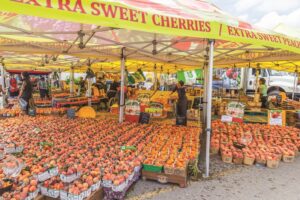Artificial intelligence on the farm
CAN DATA POWER WEED CONTROL?

AS FARMERS CONTINUE TO ENCOUNTER NEW OR RESISTANT WEEDS in their fields, they are looking for alternative ways to win the battle against these unwanted plants. A new company on the scene believes they have a solution.
Through agronomic models and artificial intelligence (AI), Geco Strategic Weed Management has created predictive weed control technology to help farmers identify areas of their fields that may be susceptible to increased weed pressure before the weeds even push through the soil in the spring. This mapping technology can be used with current equipment, such as sprayers, fertilizer spreaders, or planters on the farm and has the potential to reduce herbicide application by up to two-thirds by allowing multi-rate application in-field, spraying only where necessary or even increasing plant populations in these specific areas to thwart weed growth.
When asked what led the company to create this technology, founder and CEO Greg Stewart says he was “fascinated by what goes into growing crops, and he wondered how farmers could leverage the data available to them to deal with weeds.”
Before starting Geco, Stewart had worked in the greenhouse industry, using data management to support growers by using analytical tools to determine when pest infestations would occur. He saw an opportunity to transfer that knowledge to the grain industry.
HOW DOES IT WORK?
By analyzing data such as satellite imagery from the previous five growing seasons, soil test results and information from the farm (i.e. seeding and spraying records, personal knowledge of prior weed issues, etc.), Geco can create a standard prescription map to predict where weed infestation will be the heaviest, often with a 24 hour turn-around time. While the map can be used with GPS systems, Stewart says almost half of the farmers using this technology are not using it with GPS. When asked about limits on field size, Stewart said the technology can be used in fields as small as 10-20 acres.
Starting costs are approximately $5 per acre, with farmers usually trialling the technology in a couple of fields, expanding annually. As more acreage is added, the price decreases. Geco’s goal is to have farms running on an annual subscription rather than per acre fees.
AWARD-WINNING TECH
As the winner of the Innovative Farmers of Ontario (IFAO) and Foresight Sustainable AgTech for Profitability Innovative Challenge, Geco’s technology had to meet a variety of criteria, including demonstrating it could be profitable within the first year of use, had been tested on farms, was environmentally beneficial, and could be used across a variety of farming conditions. By reducing the need for blanket application of herbicides, cost savings are immediately realized, and the impact on the environment is lessened.
“With agriculture playing a vital role in growing Canada’s economy and reaching our net zero targets, the Sustainable Agtech for Profitability Challenge was a crucial endeavour for the Innovative Farmers Association of Ontario. We are thrilled to collaborate with Geco, who are bringing new solutions to agriculture that are better for the environment and for farmers’ bottom line,” says Tori Waugh, executive director, IFAO.
Sponsored by Farm Credit Canada (FCC), the innovation award, launched in March 2024, seeks to find agtech solutions that improve decision-making and analysis of field crop farmers’ operations, enabling optimized soil health, biodiversity, profitability, and overall sustainability management.
“FCC is proud to support Foresight and the Sustainable Agtech for Profitability challenge. Sustainability and profitability go hand in hand, and by collaborating with forward- thinking groups like Foresight and the Innovative Farmers Association of Ontario, we are committed to driving advancements in nutrient management, soil health, and productivity, ensuring a resilient future for Canada’s agricultural community,” says Graeme Millen, vice-president, FCC.
The technology has been tested in wheat, canola, soybeans, corn, and barley crops. Initially, Geco worked with three farms and now supports 58 farms across the Canadian prairies, northern U.S., and Quebec. Geco is actively looking to expand into Ontario to work with farmers for future growing seasons. Find out more at www.geco-ag.com. •



























